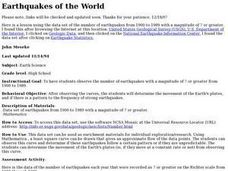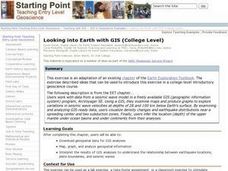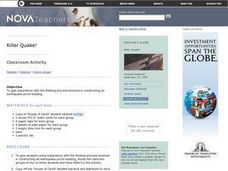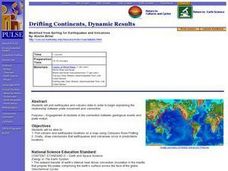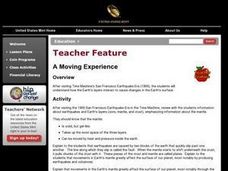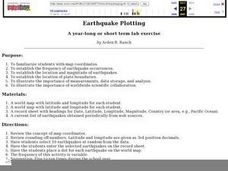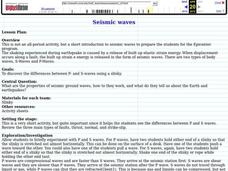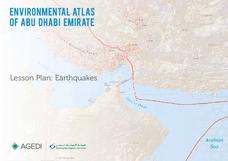Curated OER
Shake, Rattle and Erupt
Students study myths regarding four earthquakes myths. They receive a list of supplies each family should have at home to prepare for an earthquake and construct an "Earthquake Preparation" poster showing some of the most important items...
Curated OER
Earthquakes and Seismic Waves
Students investigate the Richter scale and seismology in a teacher-led lab in which they are introduced to the concept of seismic waves and epicenter location. They further investigate the inner workings of a seismograph and practice...
Curated OER
Earthquake Introduction
Students investigate basic principles and properties of earthquakes, including vocabulary, causes, and types of faults. They examine history of seismic activity in their home state, and complete "Locating Patterns of Distribution" lab.
Curated OER
Erosion in Different Soils [Erosion Races]
Fourth graders review how erosion can happen by wind, water, and gravity which they studied in previous instructional activity. They attempt to discover if all soils erode at the same rate. In small groups, 4th graders experiment with...
Curated OER
Musical Plates
Sixth graders engage in a study of the plates and how they are part of the formation of the ever changing landscape of planet earth. They access web sites that have applications for observation and conducting different activities. The...
Curated OER
Solid Earth Socratic Questions
Young scholars participate in a whole class discussion to relate what they know about earthquakes to the processes of plate tectonics. They respond to prompts that lead them to conclusions about the layers of the earth.
Curated OER
Earthquakes of the World
Young scholars observe data of earthquakes with a magnitude of 7 or greater on the Richter scale from 1900-1989. The data is evaluated and assumptions are made about the interpretation.
Curated OER
Looking into Earth with GIS
Students work with data from a seismic wave model in a freely available GIS (geographic information system) program, ArcVoyager SE. Using a GIS, they examine maps and produce graphs to explore variations in seismic wave velocities at...
Curated OER
Killer Quake!
Students explore earthquakes. They build and test models to see if they will withstand an earthquake. Students explain their reasons for constructing buildings in a particular manner.
Curated OER
1906 Earthquake
Students explore the impact of the 1906 earthquake on the population of San Jose. They explore two different perspectives of earthquakes. Students write a news bulletin as if they were reporting on the earthquake. They are then...
Curated OER
Drifting Continents, Dynamic Results
Students plot earthquake and volcano data using a Compass Rose Plotting. They explain the relationship between plate movement and connection. They draw conclusions that earthquakes and volcanoes occur in predictable locations.
Curated OER
A Moving Experience
Students visit Time Machine's San Francisco Earthquake Era. They understand how the Earth's layers interact to cause changes in the Earth's surface. They review information about earthquakes and Earth's layers.
Curated OER
Did You Feel That? Earthquake Data Chart
Learners plot earthquakes on the world map using coordinates of longitude and latitude. They designate the earthquakes magnitude with a symbol which they include in the map key.
Curated OER
Peru's Earthquake
Students identify the patterns of earthquakes by mapping USGS data and comparing it to mapped tectonic plates. They discover the relationship between earthquakes and the moving plates of the Earth's crust.
Curated OER
Researching Intermountain West Earthquakes
Students research earthquakes using the internet and newspapers. They discover the earthquake's effect on people and buildings. They report their findings to the class.
Curated OER
Earthquake Plotting
Students become familiar with map coordinates. They establish the frequency of earthquake occurrences and study the location and magnitude of earthquakes. To establish the location of plate boundaries.
Curated OER
Seismic waves
Students discover the differences between P- and S-waves using a slinky. They see that when displacement occurs along a fault, the built up strain of energy is released in the form of seismic waves.
Curated OER
Earthquakes
Students research statistics about the last five large earthquakes. They compare data in small groups and present their information orally to the class. They also attempt to predict the next large earthquake.
Curated OER
Earthquakes
Learners examine why earthquakes happen, and where most earthquakes occur in the world. They discuss how engineers and architects try to construct stronger buildings, then design and build an earthquake-proof structure.
Curated OER
Learning from history: can it save lives?
Students research and document lessons learned from this disaster, then compile and synthesize information. They write effectively for public education purposes and use visual communications tools
Curated OER
Earthquake Analysis
Students analyze and plot the coordinates for several recent earthquakes on a world map. They learn not only about research and geology, but about map-making and data analysis. They think of other ways to analyze the data given.
Curated OER
Earthquake Waves
Fourth graders pour three cups of sand on the top of a plastic table near the edge. They tap the table lightly with the rubber mallet. When they tap the table lightly they see the sand ump into the air.




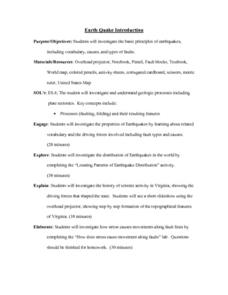
![Erosion in Different Soils [Erosion Races] Lesson Plan Erosion in Different Soils [Erosion Races] Lesson Plan](http://content.lessonplanet.com/resources/thumbnails/140405/large/cgrmlwnvbnzlcnqymdezmdmyos01nde3lxfmmzy0dc5qcgc.jpg?1414240121)


